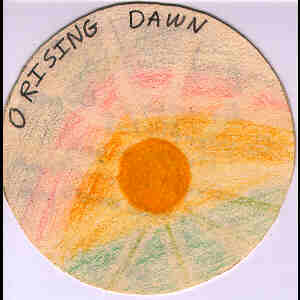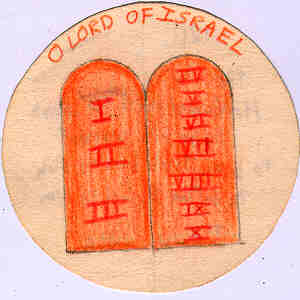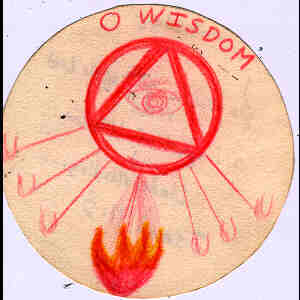The Annunciation
(Yes, Gabriel has a beeper. Or maybe it's a cell phone - after all, he is the patron saint of communications!)
"The angel Gabriel was sent to Nazareth, a town of Judah, to a virgin betrothed to a man named Joseph, of the House of David. The virgin's name was Mary.
The angel said: 'Hail, full of grace, the Lord is with thee.'
Mary wondered what this greeting could mean, and the angel went on.
'Do not be afraid, Mary, for you have found favor with God. You will conceive and bear a son, and you will name Him Jesus, for He will save His people from their sins.'
Mary then asked, 'How can this be, since I do not know man?'
Gabriel responded, 'The Holy Spirit will come upon you, and the Power of the Most High will overshadow you. Thus, the holy child to be born will be called the Son of God. Moreover: Elizabeth, your kinswoman, has also conceived a son in her old age. She who was thought to be sterile is now in her sixth month, for NOTHING IS IMPOSSIBLE FOR GOD.'"
Here, we should pause, and wait. This is the moment, far more exciting than any other moment which has ever been - even the time in Eden with the "apple"... If this was a Hardy Boys or Nancy Drew story, we would go to a new chapter - but no cliffhanger of any novel was ever as tense and as dramatic as this one. All the Universe, and God Himself waits: what will she say?
"Then Mary said: 'Behold the handmaid of the Lord. BE IT DONE UNTO ME ACCORDING TO THY WORD.'
And with that [message], the angel left her [and returned to God]..."
I
told you the heavenly message-channel was bi-directional, didn't I???
For (once Gabriel delivered his message, God acted upon it; no physical causation can proceed as fast as this!) now! NOW! this is the moment of the Incarnation.
Here is one of those points where one really needs to flip to another part of the Bible. For (if we were doing things in strict chronology) the very next line ought to be this one from St. John:
"And the Word was made flesh, and dwelt among us."
Here is the pivot, the cardinal point, the division between BC and AD. (The day we recall this is the great solemnity of the Annunciation, celebrated nearly nine months ago, on March 25.) Irrepeatable and singular, but utterly real, and wonderfully comforting, and warm and familiar, there in Nazareth, in Galilee...
Whoa! Wait!! Hold on!!! Didn't we just hear that the Christ was to be born in
Bethlehem???
Heh, heh, heh.
In previous postings I have mentioned that there is another part of the Christmas story which does not get talked about very much. In fact, it was going on for quite some time. And yesterday I mentioned that it is called Rome.
There are many curious points we ought to observe about Rome, and its connection to Christmas, and to Christianity. Some of them are hinted at in Chesterton's great work,
The Everlasting Man. Others seem to get skipped over. But besides the obvious point which everyone will recall about Christmas and its Roman connection (hint: April 15) there is one other connection which is far less well known. I will tell you about it, for it is very curious, and bears directly upon my comments for the remaining days of Advent.
I have just mentioned the literary trick called a "cliff-hanger" - the device of putting a very exciting event at the very end of a chapter. This is always hard for a child, permitted to read "to the end of a chapter" before turning off the light. (This is why I was glad I had a flashlight when I was young. I still do.) There are other such devices used in other ways. The orchestra leader gives the downbeat to synchronize all the musicians - and the rocket-launchers use a COUNTDOWN.
Now everyone likes to count down the days until Christmas, and as we are about to see, the Church is no exception. We even see it in the newspapers "X more shopping days until Christmas!" We have to do these things because our dates and times go "forwards" as time advances: on calendars we count upwards to mark off the days; on clocks and computers we count upwards also.
But did you know that this isn't always how it was done? The very first launch of a moon rocket was accomplished by a count-UP. (This is in Jules Verne's
From the Earth to the Moon.)
But even more amazing: on their calenders the Romans were counting DOWN. Just like little kids, they were ALWAYS counting off the number of days remaining until the next festival day.
Just like the Romans, then, our Advent calendars have numbers which DECREASE as we proceed through the days. And, in the last days of Advent, Holy Mother Church shows herself to be "child-like" - and also Roman! - by counting down the days remaining.
So far, we have adorned our Jesse Tree with all manner of curious shapes and signs. But there are seven special symbols which the Church Herself assigns, with such exalted ritual, and with such elegant language, that there is even a popular song about them. (Oh, you didn't know? Do you know what it is? yes, there ARE seven verses!)
Starting tomorrow, December 17, all over the world wherever people pray the "Divine Office", the Evening Prayer (or Vespers) will use a special antiphon to bracket the singing of the
Magnificat. Each of these antiphons is an address to our Lord under one of these seven ancient titles or symbols...
Then, let us do as the Romans, and number our days downwards until Christmas. For:
"Remember the former age, for I am God, and there is no God beside, neither is there the like to me: Who shew from the beginning the things that shall be at last, and from ancient times the things that as yet are not done, saying: My counsel shall stand, and all my will shall be done: Who call a bird from the east, and from a far country the man of my own will, and I have spoken, and will bring it to pass: I have created, and I will do it. Hear me, O ye hardhearted, who are far from justice. I have brought my justice near, it shall not be afar off: and my salvation shall not tarry. I will give salvation in Sion, and my glory in Israel."


















